- Home
- Joanne Harris
Five Quarters of the Orange: A Novel Page 9
Five Quarters of the Orange: A Novel Read online
Page 9
I shrugged. “Couple of things,” I said carelessly. The purse was in the pocket of my smock, and I smiled inwardly at its comforting weight. “Pike. Just a small one,” I said.
Cassis laughed. “You might catch the small ones, but you’ll never catch Old Mother,” he said. “Even if you did, what’d you do with it? A pike that old wouldn’t be any good to eat. Bitter as wormwood and full of bones.”
“I’ll catch her,” I said stubbornly.
“Oh?” His tone was careless, disbelieving. “And what then? You’ll make a wish, will you? Wish for a million francs and an apartment on the Left Bank?”
I shook my head mutely.
“I’d wish to be a movie star,” said Reine, toweling her face. “To see Hollywood, and the lights, and Sunset Boulevard, and to drive in a limousine and to have dozens and dozens of dresses….”
Cassis gave her a brief look of scorn, which cheered me immensely. Then he turned to me. “Well, what about it, Boise?” His grin was brash and irresistible. What’s it going to be? Furs? Cars? A villa in Juan-les-Pins?”
I shook my head again. “I’ll know when I’ve caught it,” I said flatly. “And I’ll get it too. See if I don’t.”
Cassis studied me for a moment, the grin sliding from his face. Then he made a little noise of disgust and turned back to his ablutions.
“You’re something, Boise,” he said. “Really something, you know?”
Then we raced off to finish the day’s chores before Mother woke up.
12.
There is always plenty to do on a farm. Water to bring in from the pump, leaving it in metal buckets on the cellar tiles so that the sun doesn’t warm it, goats to milk, the pail to be covered with a muslin cloth and left in the dairy, the goats then taken to the pasture so that they don’t eat all the vegetables in the garden, hens and ducks to feed, the day’s crop of ripe strawberries to pick, the baking oven to stoke even though I doubted Mother would be doing much baking today. The horse, Bécassine, to be let out into the pasture and fresh water brought to the troughs. Working at maximum speed it took us the best part of two hours to finish, and by the time we did the sun’s heat was gaining, the night damp already steaming off the baked-earth paths and the dew drying on the grass. It was time to go.
Neither Reinette nor Cassis had mentioned the money question. There was no need. I paid my way, Cassis had told me, assuming that this would be impossible. Reine looked at me oddly as we picked the last of the strawberries, wondering perhaps at my self-assurance, and when she caught Cassis’s eye she giggled. I noticed that she had dressed with especial care this morning—her pleated school skirt, ankle socks and shoes with a red short-sleeved sweater—and her hair was rolled into a fat sausage at the back of her head, secured with hairpins. She smelt unfamiliar too, a kind of sweetish powdery smell like marshmallow and violets, and she was wearing the red lipstick. I wondered if she was meeting someone. A boy, perhaps. Someone she knew from school. She certainly seemed more nervous than usual, picking the fruit with the delicate haste of a rabbit feeding among weasels. As I moved between the rows of strawberry plants I heard her whisper something to Cassis, then I heard her high, nervous giggle.
I shrugged inwardly. I supposed they were planning to go off somewhere without me. I had persuaded Reine to take me, and they would not go back on that promise. But as far as they knew, I had no money. That meant they could go to the pictures without me, perhaps leaving me by the fountain in the market square to wait for them, or sending me on an imaginary errand while they went to meet their friends…. Sourly I bit down on the thought. That was supposed to be how it went. So sure of themselves that they had overlooked the one obvious solution to my problem. Reine would never have swum the Loire to the Treasure Stone. Cassis still saw me as the little sister, too much in awe of the adored older brother to hazard the slightest thing without his permission. Occasionally he looked at me and grinned his satisfaction, his eyes gleaming with mockery.
We left for Angers at eight o’clock, I riding on the back wheel of Cassis’s huge ungainly bike with my feet wedged perilously beneath the handlebars. Reine’s bicycle was smaller and more elegant, with high handlebars and a leather saddle. There was a bicycle basket across the handlebars in which she carried a flask of chicory coffee, and three identical packets of sandwiches. Reine had tied a white scarf around her head to protect her coiffure, and the tails whipped at her nape as she rode. We stopped three or four times on our way—to drink from the flask in Reine’s bicycle basket, to check a soft tire, to eat a piece of bread and cheese in lieu of breakfast. At last we came to the suburbs of Angers, passing the collège—closed now for the holidays and guarded by a pair of German soldiers at the gate—and down streets of stucco houses toward the town center.
The cinema, the Palais-Doré, was in the main square, close to where the market was held. Several rows of small shops lined the square, most of which were opening for the morning, and a man was washing down the pavement with a bucket of water and a broom. We pushed the bikes then, steering them into an alley between a barber’s and shuttered butcher’s shop. The alley was barely wide enough to walk through, and the ground was piled with rubble and debris; it seemed safe to assume that our bikes would be left alone. A woman at the terrasse of a café smiled at us and called a greeting; a few Sunday customers were already there, drinking bowls of chicory and eating croissants or hard-boiled eggs. A delivery boy went by on a bicycle, ringing his bell importantly; by the church a newspaper stand sold single-sheet bulletins. Cassis looked round, then made his way to the newsstand. I saw him hand something to the newspaper man, then the man handed Cassis a bundle, which quickly vanished into Cassis’s trouser waistband.
“What was that?” I asked.
Cassis shrugged. I could see that he was pleased with himself, too pleased to withhold the information just to annoy me. He lowered his voice conspiratorially and allowed me a glimpse of rolled-up papers, which he immediately covered up again.
“Comic books. Serial story.” He winked at Reine self-importantly. “American film magazine.”
Reine uttered a squeak of excitement and made as if to grab his arm. “Let me, let me see!”
Cassis shook his head irritably. “Shh! For God’s sake, Reine!” He lowered his tone again. “He owed me a favor. Black market,” he mouthed. “Kept them for me under the counter.”
Reinette looked at him in awe. I was less impressed. Perhaps because I was less aware of the scarcity of such items; perhaps because the seeds of rebellion already growing in me pushed me to scorn anything of which my brother seemed overly proud. I gave a shrug to show my indifference. Still, I wondered what kind of “favor” the newspaper man might have owed Cassis, and finally concluded that he must have been bragging. I said as much.
“If I had contacts with the black market,” I said with a passable show of skepticism, “I’d make sure I got better stuff than a few old papers.”
Cassis looked stung. “I can get anything I want,” he said quickly. “Comics, smokes, books, real coffee…chocolate—” He broke off with a scornful laugh. “You can’t even get the money for a rotten cinema ticket!” he said.
“No?” Smiling, I took the purse from out of my apron pocket. I jingled it a little, so that he could hear the coins inside. His eyes widened as he recognized the purse.
“You little thief!” he breathed at last. “You rotten, bitching little thief!”
I looked at him, but said nothing.
“How did you get that?”
“Swum out and got it,” I answered defiantly. “Anyway, it wasn’t stealing. The treasure belonged to all of us.”
But Cassis was hardly listening. “You bitching, thieving…” he said again. Clearly he was disturbed that anyone other than he should obtain anything by guile.
“I don’t see that it’s any different from you and your black market,” I said calmly. “It’s all the same game, isn’t it?” I let this sink in before I continued. “And you’re ju
st upset because I’m better at it than you.”
Cassis glared at me. “It isn’t anything like the same thing,” he said at last.
I kept my expression disbelieving. It was always so easy to make Cassis give himself away. Just like his son, all those years later. Neither of them ever understood anything about guile. Cassis was red-faced, almost shouting now, his conspiratorial tone forgotten. “I could get you anything you liked. Proper fishing tackle for your stupid pike,” he hissed savagely. “Chewing gum, shoes, silk stockings, silk underwear if you wanted—” I laughed aloud at that. Brought up as we had been, the idea of silk underwear was ludicrous. Enraged, Cassis grabbed me by the shoulders and shook me.
“You stop that!” His voice cracked with fury. “I got friends! I know people! I could get—you—anything—you—wanted!”
You see how easy it was to take him off balance. Cassis was spoiled in his way, too used to being the great older brother, the man of the house, the first to go to school, the tallest, the strongest, the wisest. His occasional bouts of wildness—his escapades into the woods, his daredevilry on the Loire, his small thefts from market stalls and shops in Angers—were uncontrolled, almost hysterical. He took no enjoyment from them. It was as if he needed to prove something to both of us, or to himself.
I could tell I perplexed him. His thumbs were digging so deeply into my arms that they would make great ripe blackberry marks on my skin the next day, but I did not show any sign of it. Instead I just looked at him steadily and tried to stare him out.
“We’ve got friends, Reine and me,” he said in a lower voice, almost reasonable now, his thumbs still gouging into my arms. “Powerful friends. Where do you think she got that stupid lipstick? Or the perfume? Or that stuff she puts on her face at night? Where d’you think we got all that from? And how d’you think we earned it?”
He let go of my arms then with an expression of mingled pride and consternation, and I realized that he was slick with fear.
13.
I don’t remember very much about the film. Circonstances Atténuantes, with Arletty and Michel Simon, an old film that Cassis and Reine had already seen. Reine at least was untroubled by the fact; she stared at the screen the whole time, rapt. I found the story unlikely, too removed from my realities. Besides, my mind was on other things. Twice the film in the projector broke; the second time the houselights went on and the audience roared disapproval. A harassed-looking man in a dinner jacket shouted for silence. A group of Germans in a corner, feet resting on the seats in front of them, began slow-clapping. Suddenly Reine, who had come out of her trance to complain irritably about the interruption, gave a squeak of excitement.
“Cassis!” She leaned over me and I could smell a sweetish chemical scent in her hair. “Cassis, he’s here!”
“Shh!” hissed Cassis furiously. “Don’t look back!” Reine and Cassis sat facing the front of the auditorium for a moment, expressionless as dummies. Then he spoke, from the corner of his mouth, like someone whispering in church.
“Who?”
Reinette flicked a glance at the Germans from the corner of her eye.
“Back there,” she replied in the same fashion. “Some others I don’t know.” Around us the crowd stamped and yelled. Cassis ventured a quick look.
“I’ll wait till the lights go down,” he said.
Ten minutes later the lights dimmed and the film continued. Cassis wriggled from his seat toward the back of the auditorium. I followed him. On the screen Arletty pranced and eye-fluttered in a tight low-cut dress. The mercury reflection lit our low-bent, running figures, making Cassis’s face a livid mask.
“Go back, you little idiot,” he hissed at me. “I don’t want you with me, getting in the way!”
I shook my head. “I won’t get in the way,” I told him. “Not unless you try to stop me coming with you.”
Cassis made an impatient gesture. He knew I meant what I said. In the dark I could feel him trembling, with excitement or nerves. “Keep down,” he told me at last. “And let me do the talking.”
We finally squatted down at the back of the auditorium, close to where the group of German soldiers made an island among the regular crowd. Several of the men were smoking; we could see dimps of red fire on their flickering faces.
“See him there, at the end?” whispered Cassis. “That’s Hauer. I want to talk to him. You just stay with me and don’t say a word, all right?”
I did not reply. I wasn’t going to promise anything.
Cassis slid into the aisle next to the soldier called Hauer. Looking around curiously I could see that no one was paying us the slightest attention except the German standing behind us, a slight, sharp-faced young man with his uniform cap tilted back at a rakish angle and a cigarette in one hand. Beside me I heard Cassis whispering urgently to Hauer, then the crackle of papers. The sharp-faced German grinned at me and gestured with the cigarette.
Suddenly, with a jolt, I recognized him. It was the soldier from the market, the one who had seen me take the orange.
For a minute I could do nothing but stare at him, transfixed.
The German gestured again. The glow from the cinema screen lit his face, throwing dramatic shadows from his eyes and cheekbones.
I cast a nervous glance at Cassis, but my brother was too deep in conversation with Hauer to notice me. The German was still watching expectantly, a little smile on his lips, standing some distance away from where the others were seated. He held his cigarette with the tip cupped into his palm, and I could see the dark smudge of his bones beneath the glowing flesh. He was in uniform, but his jacket was undone and his head was bare.
For some obscure reason, that reassured me.
“Come here,” said the German softly.
I could not speak. My mouth felt as if it were full of straw. I would have run, but was not sure my legs would carry me. Instead, I put up my chin and moved toward him.
The German grinned and dragged another breath from his cigarette.
“You’re the little orange girl, aren’t you?” he said as I came closer.
I did not reply.
The German seemed unconcerned by my silence. “You’re quick. As quick as I was when I was a boy.” He reached into his pocket and brought out something wrapped in silver paper. “Here. You’ll like it. It’s chocolate.”
I eyed him with suspicion. “I don’t want it,” I said.
The German grinned again. “You like oranges better, do you?” he asked.
I said nothing.
“I remember an orchard by a river,” the German said softly. “Near the village where I grew up. It had the biggest, blackest plums you ever saw. High wall all around. Farm dogs prowling. All through summer, I tried to get at those plums! I tried everything. I could hardly think of anything else.”
His voice was pleasant and lightly accented, his eyes bright behind a scrawl of cigarette smoke. I observed him warily, not daring to move, unsure whether or not he was making fun of me.
“Besides, what’s stolen tastes so much better than what you get for free, don’t you think?”
Now I was sure he was mocking me, and my eyes widened indignantly.
The German seemed to see my expression, and laughed, still holding out the chocolate. “Go on, Backfisch, take it. Imagine you’re stealing it from the Boches.”
The square was half melted, and I ate it straightaway. It was real chocolate too—not the whitish, gritty stuff we occasionally bought in Angers. The German watched me eat, amused, as I eyed him with undiminished suspicion, but with growing curiosity.
“Did you get them in the end?” I asked at last, in a voice thick with chocolate. “The plums, I mean?”
The German nodded. “I did, Backfisch. I still remember the taste.”
“And you weren’t caught?”
“That too.” The grin became rueful. “I ate so many that I made myself sick, and so I was found out. I got such a hiding! But I got what I wanted in the end. That’s what matters,
isn’t it?”
“That’s good,” I agreed. “I like to win.” I paused. “Is that why you didn’t tell anyone about the orange?”
The German shrugged. “Why should I tell anyone? It was none of my business. Besides, the grocer had plenty more. He could spare one.”
I nodded. “He’s got a van,” I said, licking the square of silver paper so that none of the chocolate would be lost.
The German seemed to agree. “Some people want to keep everything they’ve got to themselves,” he said. “That isn’t fair, is it?”
I shook my head. “Like Madame Petit at the sewing shop,” I said. “Charges the earth for a bit of parachute silk she got for free.”
“Precisely.”
It struck me then that perhaps I shouldn’t have mentioned Madame Petit, and I shot him a quick glance, but the German seemed hardly to be listening. Instead he was looking at Cassis, still whispering to Hauer at the end of the row of seats. I felt a stab of annoyance that Cassis should interest him more than I did.
“That’s my brother,” I said.
“Is it?” The German looked back at me again, smiling. “You’re quite a family. Are there any more of you, I wonder?”
I shook my head. “I’m the youngest. Framboise.”
“I’m very pleased to meet you, Françoise.”
I grinned. “Framboise,” I corrected.
“Leibniz. Tomas.” He held out his hand. After a moment’s hesitation, I shook it.
14.
So that was how I met Tomas Leibniz. For some reason Reinette was furious with me for talking to him, and sulked all the way through the rest of the film. Hauer had slipped Cassis a packet of Gauloises, and we both crept back to our seats, Cassis smoking one of his cigarettes and myself lost in speculation. Only when the film was finished was I ready to ask questions.
“Those cigarettes,” I said. “Is that what you meant when you said you could get things?”

 The Evil Seed
The Evil Seed Gentlemen and Players
Gentlemen and Players A Cat, a Hat, and a Piece of String
A Cat, a Hat, and a Piece of String Different Class
Different Class Chocolat
Chocolat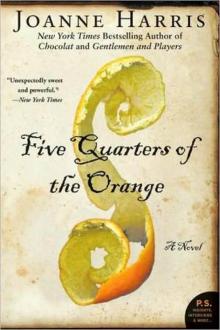 Five Quarters of the Orange: A Novel
Five Quarters of the Orange: A Novel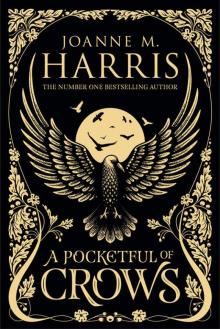 A Pocketful of Crows
A Pocketful of Crows Runelight
Runelight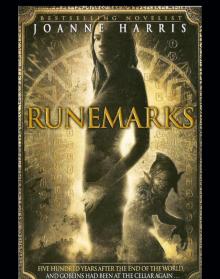 Runemarks
Runemarks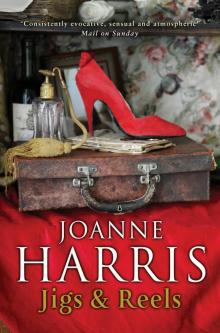 Jigs & Reels: Stories
Jigs & Reels: Stories Sleep, Pale Sister
Sleep, Pale Sister Holy Fools
Holy Fools The Testament of Loki
The Testament of Loki Peaches for Monsieur Le Curé
Peaches for Monsieur Le Curé Blueeyedboy
Blueeyedboy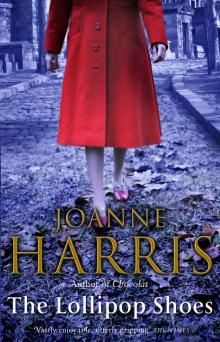 The Lollipop Shoes
The Lollipop Shoes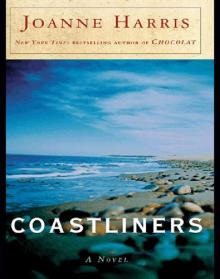 Coastliners
Coastliners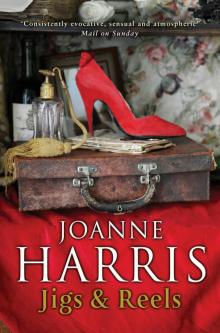 Jigs & Reels
Jigs & Reels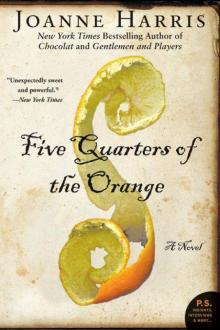 Five Quarters of the Orange
Five Quarters of the Orange